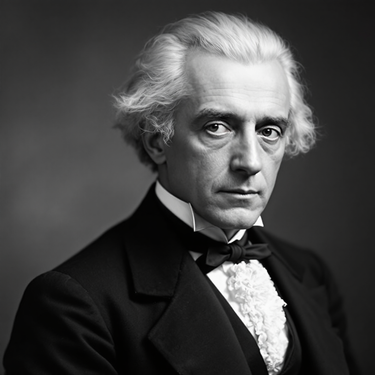Franz Liszt – The Virtuoso Pianist and Revolutionary Composer
Franz Liszt (1811–1886) was a Hungarian composer, pianist, conductor, and music teacher, regarded as one of the most important figures of 19th-century Romanticism. Known for his extraordinary technical brilliance and innovative compositions, Liszt redefined piano performance and expanded the boundaries of classical music.
A musical visionary and virtuoso, Liszt’s influence extended beyond performance—he was a pioneer of symphonic poems, thematic transformation, and program music, leaving an indelible mark on orchestral and piano repertoire. His works remain cornerstones of classical music, performed by pianists and orchestras worldwide.
A Prolific and Groundbreaking Composer
Liszt was one of the most prolific composers in history, having composed approximately 1,400 works, including:
Virtuoso Piano Music – His solo piano pieces, such as Hungarian Rhapsodies, Transcendental Études, and Mephisto Waltz, showcase dazzling technical demands and expressive depth.
Symphonic Poems – Liszt was the father of the symphonic poem, a genre blending orchestral music with literary or pictorial themes. His 12 symphonic poems, including Les Préludes and Mazeppa, influenced later composers like Richard Strauss and Claude Debussy.
Piano Concertos – His Piano Concerto No. 1 and No. 2 broke away from traditional concerto forms, seamlessly integrating movements into a continuous, evolving musical structure.
Orchestral and Choral Works – While best known for his piano music, Liszt also composed masses, oratorios, and sacred choral pieces, such as the Hungarian Coronation Mass and Christus. His later religious works reflect his deep spiritual interests.
Transcriptions and Arrangements – Liszt transcribed Beethoven’s symphonies, Schubert’s songs, and Wagner’s operas for solo piano, allowing wider audiences to experience orchestral masterpieces through piano performance.
The Unmatched Virtuoso Pianist
Liszt’s piano playing was legendary. He revolutionized piano technique with his innovative fingering, dynamic control, and expressive phrasing, elevating piano performance to unprecedented levels. His concerts—often referred to as Lisztomania—were wildly popular, drawing immense crowds.
As a piano teacher, he trained many of the greatest pianists of the next generation, including Hans von Bülow and Carl Tausig, shaping the future of piano performance.
A Musical Thinker and Innovator
Beyond composing and performing, Liszt was a scholar and writer, publishing essays on music theory, performance practice, and the role of composers in society. He championed progressive musical ideas, inspiring later composers such as Wagner, Mahler, and Bartók.
His embrace of program music—where music tells a story or conveys imagery—pushed Romantic-era composers toward a more expressive and thematic approach to composition.
A Lasting Legacy
Liszt’s contributions to music were vast and transformative. He expanded the expressive possibilities of the piano, pioneered new orchestral forms, and influenced generations of musicians. His works remain essential in concert programs, and his innovations in composition, piano technique, and musical form continue to shape classical music today.
Explore the world of Franz Liszt, where virtuosity meets deep musical expression, and discover why his music continues to captivate audiences over a century later.
























